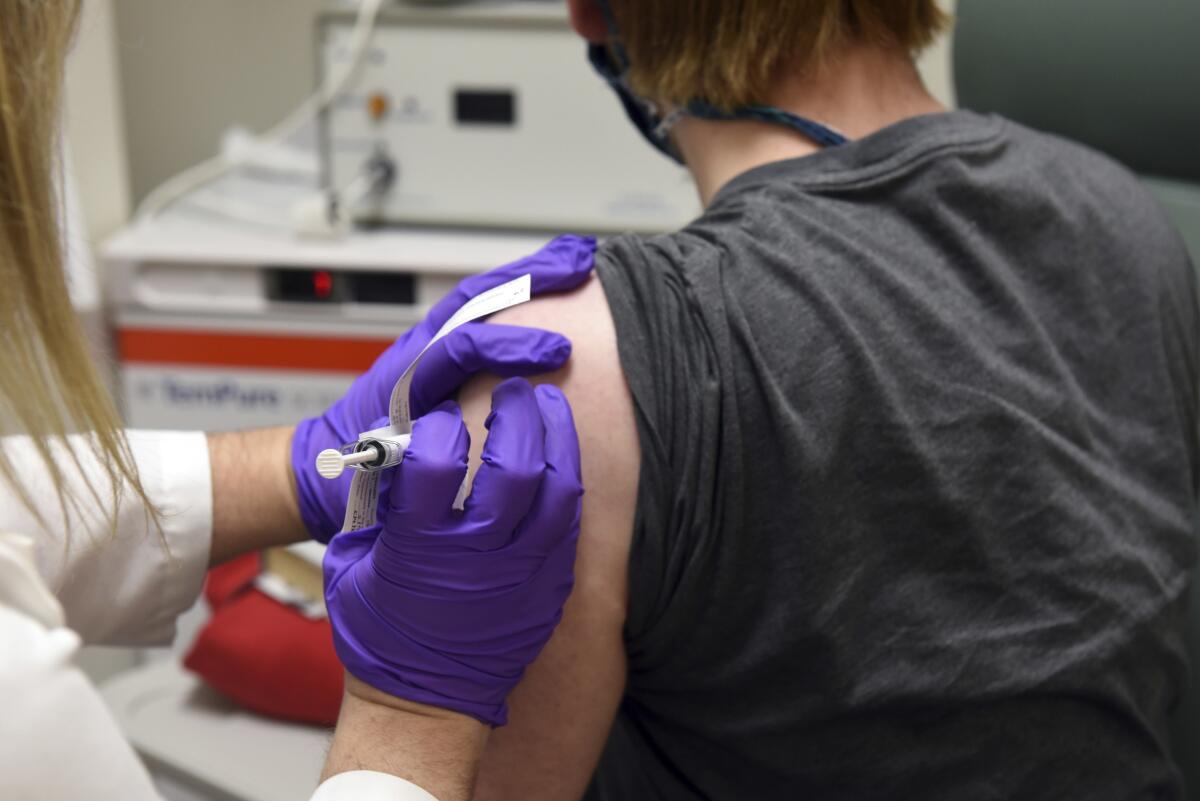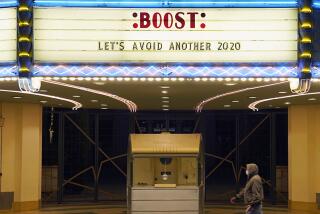Editorial: A ray of hope for the pandemic’s end — in 2021

- Share via
On Monday, a still-divided America received some pandemic news that just about everyone can be happy about: An experimental COVID-19 vaccine developed by drug manufacturer Pfizer and BioNTech, a German pharmaceutical company, is just weeks away from filing for federal approval to start producing millions of doses.
What’s more, preliminary data show this vaccine is a whopping 90% effective in protecting against a COVID-19 infection without causing serious side effects. Health officials would have been pleased with a COVID vaccine that protected 70% of the people who took it. The Food and Drug Administration requires only a 50% efficacy rate.
“The results are really quite good, I mean extraordinary,” Dr. Anthony Fauci, head of the National Institute of Allergy and Infectious Diseases, said of the Pfizer trial. The annual influenza vaccine, by contrast, infrequently tops 50% effectiveness. The results also bode well for other vaccines in final clinical trials that use the same new messenger-RNA technology.
It’s not yet clear how long the vaccine will remain effective in the body, whether it prevents people who don’t develop COVID-19 from spreading the virus to others, and whether the virus will mutate enough over time to require a series of new vaccines, as is the case with influenza. Still, Pfizer’s announcement was a hopeful development at a time when one was sorely needed.
The immediate outlook is bleak, with more than 237,000 Americans dead and a second wave of the COVID-19 pandemic well underway in most U.S. states. (In fact, it’s a third wave in some parts of the country.) The U.S. is seeing record numbers of new cases of COVID-19, averaging about 100,000 a day. Hospitals in many states are straining under an onslaught of pandemic patients, and it’s not even winter yet.
But don’t break out the champagne. It will be months before this vaccine — or any of the other promising candidates in final clinical trials — is widely available.
First, the safety and efficacy of the Pfizer vaccine have to be confirmed before it can receive an emergency use authorization from the FDA and start production. The company said it expects global production to reach 50 million doses by December and 1.3 billion by sometime in 2021. But this particular vaccine requires two shots, with three weeks in between, so that means that even in the best-case scenario there would be enough of the complete inoculation for just 25 million people this year.
While that may meet the needs of U.S. front-line healthcare workers (assuming many of those doses are distributed in the U.S.), it’s not enough to end the global pandemic or justify loosening the restrictions on commerce and activity that have been in effect for most of 2020. By all estimates, it will be well into 2021 before we reach that point.
Gov. Gavin Newsom reacted to the news Monday with an appropriately measured tone, urging Californians to not use it as an excuse to let their guard down during the holidays, as the state’s rate of positive coronavirus test results is rising. “What a mistake it would be to read these headlines and then walk away from all the extraordinary progress you and others have made to keep yourself and your loved ones safe,” Newsom said. “So please, please let us double down on the work that we have done.”
In a sign of the contentious times, however, Vice President Mike Pence kicked up a dispute over whether the Trump administration’s Operation Warp Speed deserved any credit when he tweeted, “Thanks to the public-private partnership forged by President @realDonaldTrump, @pfizer announced its Coronavirus Vaccine trial is EFFECTIVE, preventing infection in 90% of its volunteers.” The federal government has funded the development of several vaccine candidates under the Warp Speed initiative, but Pfizer’s was not one of them. “We were never part of the Warp Speed. We have never taken any money from the U.S. government, or from anyone,” Pfizer Senior Vice President Kathrin Jansen told the New York Times Sunday.
If Pence’s boast was disingenuous, so was Jansen’s assertion. Pfizer may have not received federal funding for research and development, in part because that allowed it to conduct research more quickly, but it did strike a $1.95 billion pre-purchase deal with the U.S. government as part of Operation Warp Speed to provide 100 million doses.
Ultimately, people don’t care about who gets credit for this or subsequent breakthroughs. They want a safe and effective vaccine that will allow life to return to normal. And this news offers a glimmer of hope that it will happen — but for the vast majority of us, not until next year.
More to Read
A cure for the common opinion
Get thought-provoking perspectives with our weekly newsletter.
You may occasionally receive promotional content from the Los Angeles Times.










